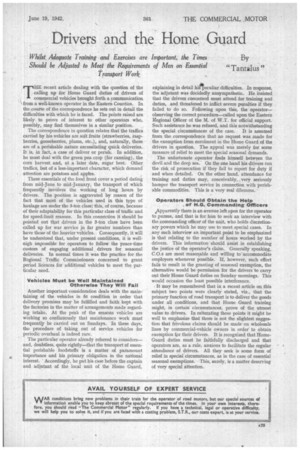Drivers and the Home Guard
Page 31

If you've noticed an error in this article please click here to report it so we can fix it.
Whilst Adequate Training and Exercises are Important, the Times Should be Adjusted to Meet the Requirements of Men on Essential Transport Work
By " Tantalus "
THE recent article dealing with the question of the calling up for Home Guard duties of drivers of commercial vehicles brought forth a communication from a well-known operator in the Eastern Counties. In the course of the correspondence he sets out in detail the difficulties with which he is faced. The points raised are likely to prove of interest to other operators who, possibly, may find themselves in a similar position.
The correspondence in question relates that the traffics carried by his vehicles are soft fruits (strawberries, raspberries, gooseberries, plums, etc.), and, naturally, these are of a perishable nature necessitating quick deliveries. It is, in fact, a case of deliver or perish. In addition, he must deal with the green pea crop (for canning), the corn harvest and, at a later date, sugar beet. Other traffics, but of a less-important character, which demand attention are potatoes and apples.
These essentials of the food front cover a period dating from mid-June to mid-January, the transport of which frequently involves the working of long hours by drivers. The position is aggravated by reason of the fact that most of the vehicles used in this type of haulage are under the 3-ton class; this, of course, because of their adaptability for this particular class of traffic and for speed-limit reasons. In this connection it should be pointed out that drivers in the 3-ton class have been called up for war service in far greater numbers than have those of the heavier vehicles. Consequently, it will be understood that, under present conditions, it is wellnigh impossible for operators to follow the peace-time custom of engaging additional drivers for seasonal deliveries, In normal times it was the practice for the Regional Traffic Commissioners concerned to grant period licences for additional vehicles to meet the particular need.
Vehicles Must be Well Maintained Otherwise They Will Fail
Another important consideration deals with the maintaining of the vehicles in fit condition in order that delivery promises may be fulfilled and faith kept with the factories in the matter of arrangements made regarding intake, At the peak of the seasons vehicles are working so continuously that maintenance work must frequently be carried out on Sundays. In these days, the procedure of taking out of service vehicles for periodic overhaul is indeed rare.
The particular operator already referred to considers— and, doubtless, quite rightly—that the transport of essential perishable foodstuffs is a matter of paramount importance and his primary obligation in the national interest. ' Accordingly, he put his case before the captain and adjutant of the local unit of the Home Guard, explaining in detail hitteculiar difficulties. In response, the adjutant was decidedly unsympathetic. He insisted that the drivers concerned must attend for training and duties, and threatened to inflict severe penalties if they failed to do so. Following upon this, the operator— observing the correct procedure—called upon the Eastern Regional Officer of the M. of W.T. for official support. Such assistance he was refused, and this notwithstanding the special circumstances of the case. It is assumed from the correspondence that no request was made for the exemption from enrolment in the Home Guard of the drivers in question. The appeal was merely for some measure of relief to meet the special seasonal demands.
The unfortunate operator finds himself between the devil and the deep sea. On the one hand his drivers run the risk of prosecution if they fail to report for duty if and when detailed. On the other hand, attendance for training and dirties may, conceivably_ very seriously hamper the transport service in connection with perishable commodities. This is a very real dilemma.
Operators Should Obtain the Help , of H.G. Commanding -Officers
„Apparently there is an avenue left open for the operator to pursue, and that is for him to seek an interview with the commanding officer of the unit, who holds discretionary powers which he may use to meet special cases. In any such interview an important point to be emphasized is that relating to the number of hours worked by the drivers. This information should assist in establishing the justice of the operator's claim. Generally speaking, C.O.s are most reasonable and willing to accommodate employers whenever possible. If, however, such effort fails to result in the granting of seasonal exemption, the alternative would be permission for the drivers to carry out their Home Guard duties on Sunday mornings. This would occasion the least possible interference.
It may be remembered that in a recent article on this subject two points were clearly stated, viz., that the primary function of road transport is to deliver the goods under all conditions, and that Home Guard training might, in certain circumstances, prove of the utmost value to drivers. In reiterating these points it might be well to emphasize that there is not the slightest suggestion that frivolous claims should be made on wholesale lines by commercial-vehicle owners in order to obtain exemption for their drivers. It is recognized that HomeGuard duties must be faithfully discharged and that operators are, as a rule, anxious to facilitate the regular attendance of drivers. All they seek is some form of relief in special circumstances, as in the case of essential seasonal exemptions. This, surely, is a matter deserving of very special attention.




















































